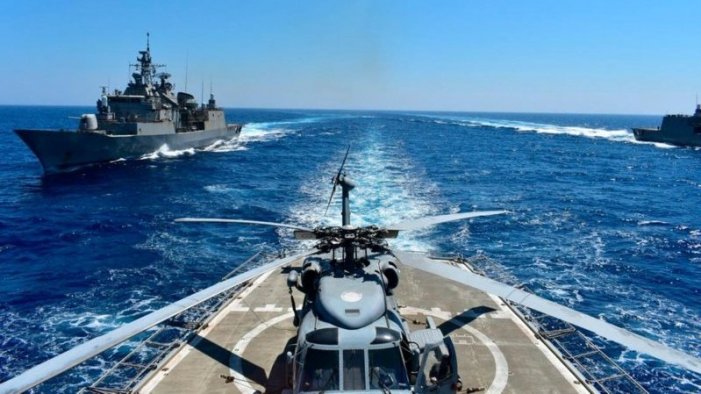The eastern end of the Mediterranean Sea keeps in its annals the history of political and commercial relations between three continents: Asia, Africa and Europe. The past 10 years are key to understanding the recent events that are attracting the attention of the international press. The explosion of the Arab Spring that led to military conflicts such as the civil wars in Syria, Libya, and Yemen reconfigured the entire geopolitical chessboard of the Middle East and North Africa. Moreover, it provoked tensions among the members of NATO, exposing the fact that this holy alliance only functioned as an extension of the interests of a few countries at a time when multilateral organizations seem to be fracturing.
A humanitarian crisis generated by migratory waves of refugees that broke over the European coasts, created a monumental problem for the European Union, which has been experiencing successive economic crises since 2008. The crisis also led to the military forces stationed by NATO on the Mediterranean to put their efforts into stopping the ships that are full of people escaping from the various armed conflicts, and economic and environmental crises. Of course, this meant deporting refugees to their home countries. NATO’s task also grew to include confronting the jihadist groups that proliferated throughout the region. While the imperialist powers were in retreat, each of the regional powers that intervened pursued their own objectives, making the situation increasingly complex.
The discovery of vast hydrocarbon deposits in the Mediterranean region — almost 10 thousand billion gallons — contributes to a deepening situation with growing inter-state tensions. Hydrocarbons are the principal constituents of natural gas and petroleum, and are critical in the production of plastics, rubbers, fibers, explosives, and industrial chemicals. The extraction of these resources in the eastern Mediterranean basin would imply the control of a good part of the energy industry that feeds Europe. Though this industry was paralyzed during the pandemic, it is expected to rebound as the world economy reactivates. Additionally, access to the basin would eventually provide control of trade routes throughout the region, such as those from the Suez Canal, which transport much of the goods coming from Asia.
These deposits are being claimed by all the countries that have a coast facing that region: Israel, Greece, Turkey, Libya, Egypt, and Lebanon. For all of these countries, this is a great opportunity to alleviate the economic crises of the region. To this end, in Cairo at the beginning of 2019, the Eastern Mediterranean Gas Forum was created to open up cooperation to exploit the basin’s resources. The aim of the organization is for all parties to benefit by creating a new center of gravity of the energy market, which would include the EastMed pipeline that would start from the Israeli coast. However, one of the countries with the greatest interest in the hydrocarbon deposits was left out of the Forum: Turkey.
This is the source of the dispute between Turkey and Greece. The discussion revolves around who has the rights to explore and exploit the maritime platforms, something that is very clear in international law — twelve maritime miles from the coast — but which, in the case of Greece and Turkey, is more difficult due to the 5,000 islands that form the Greek territory in the Aegean Sea and its proximity to the Turkish coast. While both countries had previously agreed that the distance should be six miles, Greece recently extended it to twelve miles of territorial waters, triggering Turkish President Erdogan’s anger.
At the same time, Greece established agreements with Egypt about the exploitation of the Zohr field close to the latter nation. Egypt in turn has the opportunity to reduce its dependence on tourism as the main source of foreign currency, which as a result of the pandemic has strongly declined. For his part, President Erdogan set up bilateral agreements with Al Farraj, the Libyan Prime Minister of the government recognized by the UN, for the drilling of part of the continental shelf of the country, without respect to international law.
The island of Cyprus is in the middle of the tense environment brewing in the Mediterranean. The island is politically split in two, with around 10,000 Turkish troops stationed in the pro-Turkish north — the Turkish Republic of Northern Cyprus, established in 1974. The other part of the island is governed by Greek Cypriots linked to the European Union and allied with the Greeks. In this sense, the government of the north, only recognized by Turkey, worked out an agreement with Erdogan for the exploitation of the Mediterranean waters.
With a dubious carte blanche under its arm, Turkey began to send the seismic prospecting ship Oruç Reis on various missions, escorted by military vessels. The move infuriated Greece and several Arab countries that have interests in the region, and put the rest of the NATO countries on alert — France and Italy, which have their most important oil company operating in the area, sent military support to deter Erdogan’s actions.
Egypt — which is also confronting Turkey in the Libyan civil war by supporting General Haftar — and the United Arab Emirates, which sent part of its air force for military exercises, are both supporting Greece. Similarly, Emmanuel Macron exerted soft power in Lebanon after the explosion in the port to try to gain influence over the hostile and resource-rich region. In the midst of these developments, Serbia announced that it will move its embassy to Jerusalem, strengthening its alliance with the U.S. and Israel, which provoked the Turkish government’s anger.
On some level, these alliances are aimed at dissuading the nationalist pretensions of Erdogan, who is fighting for a regional hegemonic position. As each country pursues its own interests, Turkey’s ties with the “West” become more and more contradictory.
President Erdogan has been trying to advance alliances with other countries to reach a strategic balance of forces. Among these allies is Russia, which above all is interested in defending its military bases in Tartus and Latakia — both in Syria — and maintaining its position as Europe’s main energy supplier. Russia also recently launched the Turkstream pipeline which runs from Russia to Turkey, extending the reach of Russian oil.
Turkish natural gas exploration off the Greek islands of Rhodes and Kastellorizo in the eastern Mediterranean has increased in recent weeks. Athens considers the exploration to be illegal. The European Union has also condemned Turkish actions and called on Ankara to stop them. Greece has accused Turkey of carrying out hydrocarbon prospecting and exploration activities “illegally” within a short distance of the Greek islands. Ankara rejects these accusations and maintains that it has the right to explore the area, considering the waters in which gas is being drilled experimentally to belong to its continental shelf. This led to military clashes between ships and fighters from both sides.
For the EU, both Greece and Turkey — members of NATO — have been central to the control of migration routes in recent years. Erdogan repeatedly used this fact to bargain for greater concessions in the refugee agreements involving $1 billion a year to Turkey, but the situation generated a very important internal crisis. The same goes for Greece, which has just experienced its worst economic crisis in recent history. In both countries, nationalism has exploded as was demonstrated in the region of Thrace, where Erdogan has opened the doors to thousands of Syrian refugees to enter Europe, who are systematically repressed by the Greeks.
Tensions between the two countries are at their highest in twenty years. For the moment, a military conflict is unthinkable; however, if one arises then the question will be what form it will take. The position of the Turkish army, although it maintains several tactical advantages over the Greeks,is divided on its borders with Syria, Azerbaijan, Armenia, and Iraq. In addition, Turkey is participating in the Libyan civil war, and would not be in a position to carry out a small-scale conflict — let alone a full-on war — with Greece, which is supported by several powers. Rather, Erdogan’s provocations are a response to domestic crises like the collapse of the Turkish lira. Turkish natural gas exploration is an opportunity to address Turkey’s economic and energy crisis by becoming a supplier of hydrocarbons and aligning its population behind nationalist projects, while at the same time pressing for a place in negotiations with other countries. The current tensions are a sign that geopolitical re-arrangements are becoming more complex, shrinking the available space at the table.
Originally published in La Izquierda Diario.











